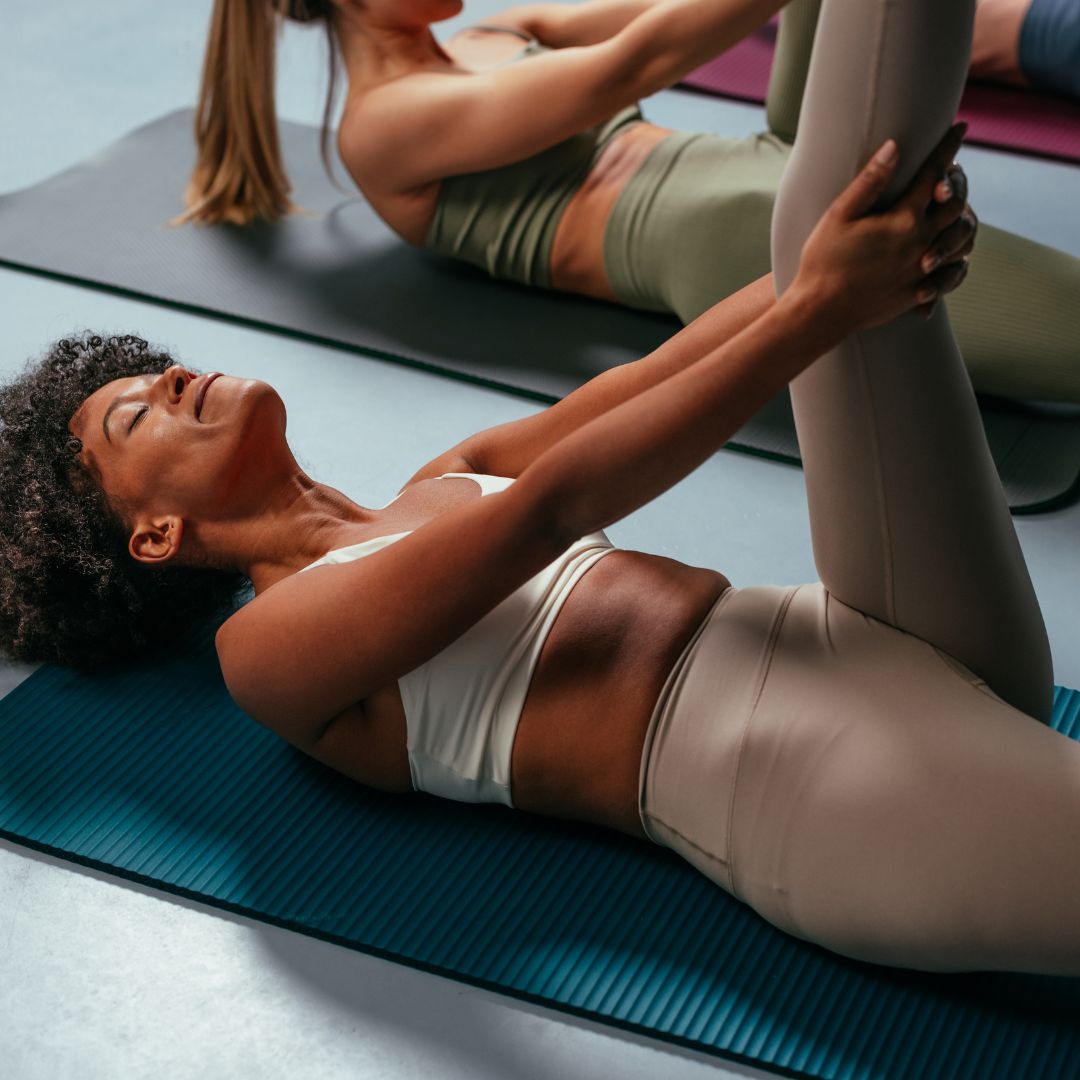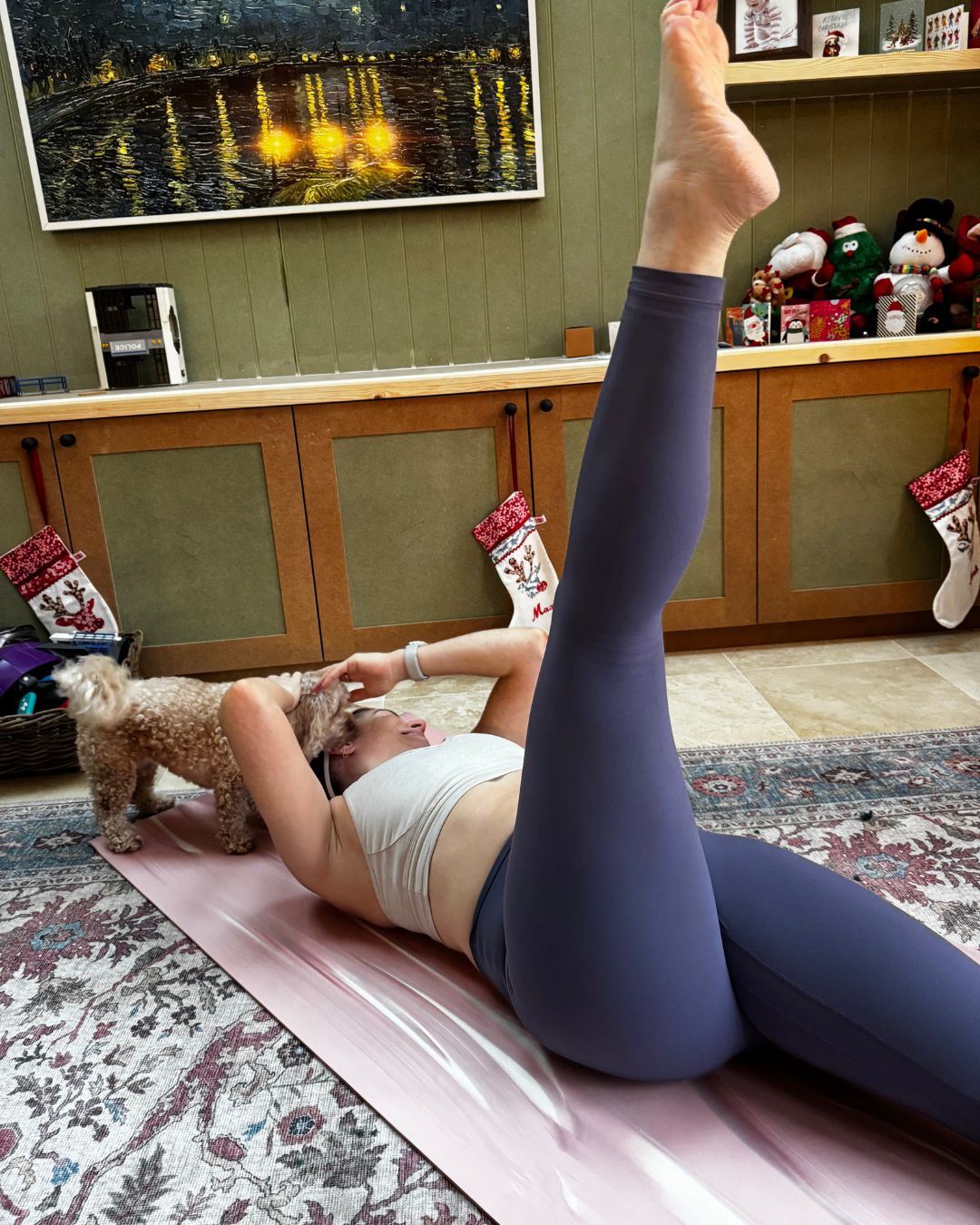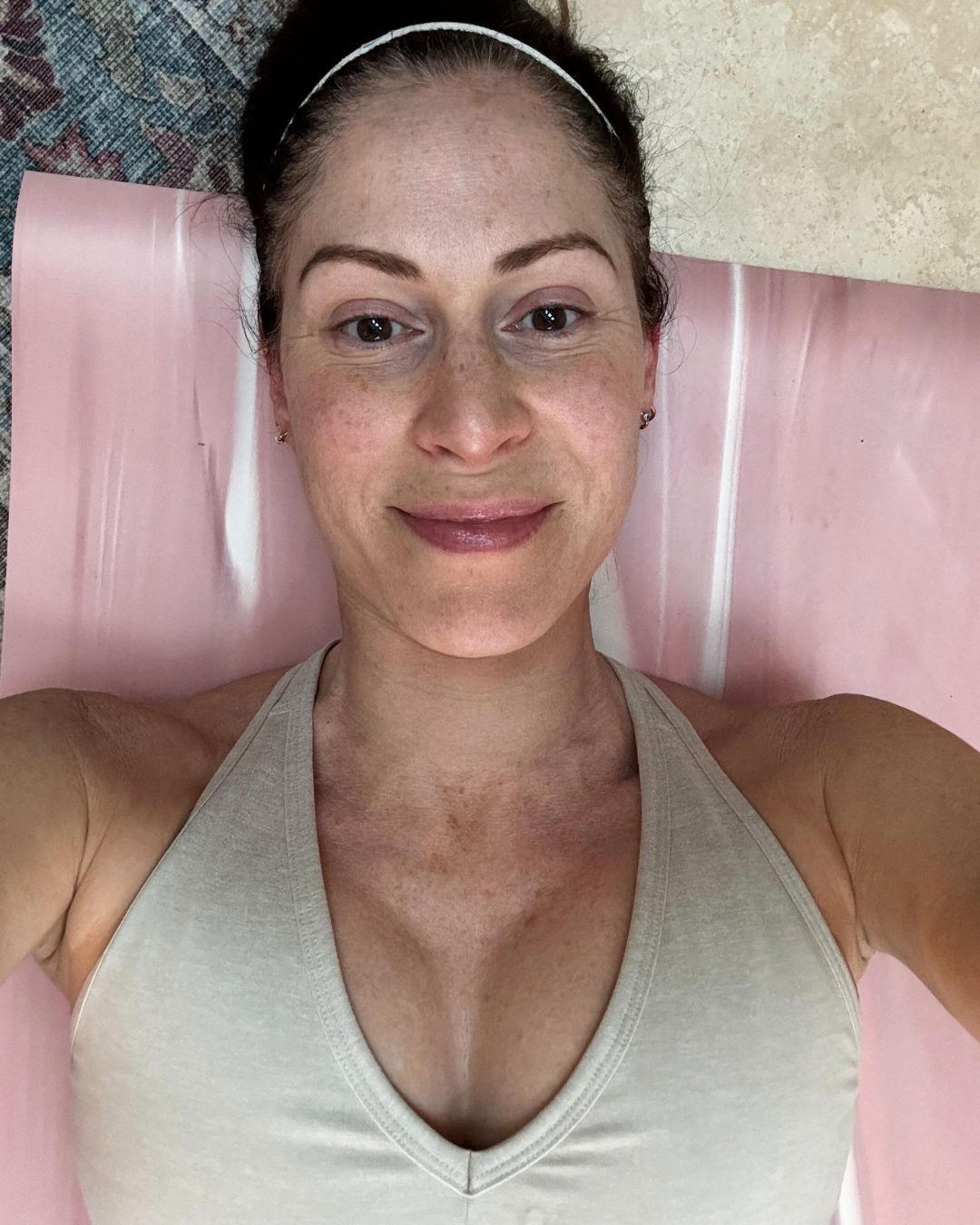
It's no exaggeration to say I've done more Pilates recently than ever before - and that's a lot, considering I've been practising the method for over a decade. Pilates has been the workout of the past few years, and while loads of newer types of Pilates have sprung up recently (we're looking at you, Power Pilates, wall Pilates, HIIT Pilates and more), I'm something of a traditionalist when it comes to how I practice, preferring the classic moves to more contemporary styles.
So, when I was asked to spend a week honing one of Joseph Pilates's original Pilates movements, the leg circle, I was thrilled. It's all too easy to go through the motions in our fitness regimes and not focus on why we're doing what we're doing. Not to mention, when we do this, we can lose form and technique, which is vital for reaping maximum benefits from moves.
Speaking of benefits, there are so many reasons I love/hate a leg circle. I spoke to physiotherapist, Pilates instructor and founder of Core LDN, Claire Mills, about why they're so good. "Leg circles are a great exercise as they really challenge core control alongside hip control - which is so important for optimal lower body function," she tells MC UK. "They also work on the flexibility of the hip and back of the leg including your hamstrings. What's not to love about targeting all those things in one exercise?"
My hip flexors are permanently tight, thanks to a combination of running, cycling and a mainly desk-bound job, so I'm interested to see if a week of targeted mobility will loosen them up - not to mention, my core can always benefit from some work, too. Keep scrolling to find out how I got on, but while you're here, do check out more Pilates content, from the best 10-minute Pilates workouts and the best free Pilates workouts to the benefits of Pilates and how often you should do Pilates, here. Read how staffers got on trying an at-home Reformer Pilates machine, Pilates toe taps every day, Pilates clams every day, and Pilates roll-ups every day, too.
I tried the raved-about Pilates leg circles every day for a week - here's my verdict
What are Pilates leg circles?
If you're a Pilates newbie, you might be wondering what leg circles are. The fourth of the 34 classical Pilates movements set out in Joseph Pilates' original repertoire, the leg circle is a straightforward move than belies it's effectiveness.
"Pilates leg circles are part of the classical repertoire and they are a simple but tricky exercise that challenges your core and trunk stability," notes Pilates instructor and founder of Pilates Prescription, Rebecca Dadoun. "The move is performed lying down on your back with one leg extended on the mat and the other leg reaching towards the ceiling in a turned out position. Your palms should be in a low V position and pressing down onto the mat, The leg towards the ceiling then draws circles while you keep the rest of your body still and stable."
@haysunshinepilates ♬ Lana Del Rey-Summertime sadness (Bootleg)(Morello Malt remix) - Morello Malt
What are the benefits of Pilates leg circles?
So, how can such a seemingly simple move be beneficial, you might be wondering. Well, prepare to be pleasantly surprised: leg circles pack quite the punch, benefits-wise.
1. They're good for core strength and stability
Pilates is a core-centred practice, with all moves starting from a foundation of a strong and stable core. As such, it's inevitable that leg circles will - despite their name - be a strong core move.
"Pilates leg circles are a classic mat exercise designed primarily to strengthen the core, stabilise the pelvis and strengthen the hips," explains Pilates instructor Aleksandra Warburton. "They work to engage the deep core muscles while promoting coordination and control, which are key principles of Pilates."
2. They enhance pelvic stability
Pelvic stability is key to a leg circle - and, in fact, to almost all human movement patterns. Essentially, when we talk about pelvic stability, we mean the ability to hold the pelvis in away that supports alignment and control, helping to prevent strains and injury.
"Leg circles are a great isometric exercise as they require you to use your deep core muscles to stabilise your spine and pelvis to enable you to support the moving leg," notes Mills. "You need to stabilise one side of the pelvis while dynamically moving the other leg in it's hip joint."
3. They promote hip joint flexibility and strength
Pilates leg circles are excellent for improving your range of motion in the hip joint, thereby strengthening the hip flexor muscles. Healthy and flexible hips are essential for everyday life - they help us to walk, climb, kick a ball, get in and out of the car, and more.
A quick biology lesson for you: a simple ball and socket joint, the hip is the joint between the pelvis and the leg, and it's important for these two areas to be able to move independently of each other. Put simply, being able to move the femur (thigh bone) while maintaining stability in the hip helps our body to produce fluid at the joint, keeping it healthy and making movement easier.
"A leg circle will help you work on the control and strength at the hip," adds Mills. "This includes the glutes and hip flexors, which work as antagonistic muscle pairs to control hip flexion and extension, essential for hip strength, power and preventing injury."
4. They're a full-body move
Yes, they're called leg circles, but don't be fooled - you'll work far more than simply your legs with this move.
"This exercise is actually full body integration," agrees Dadoun. "You have the obvious benefits of hip mobility and strength but also you'll be working on grounding through the stabilising leg, stabilising the core to prevent the body tipping, the backs of the arms are working to press into the mat, all alongside lots of strengthening of the working leg muscles."
@rapilates ♬ Bed Chem - Sabrina Carpenter
How to perform a leg circle with good form
Before I start my week-long challenge, I want to make sure I'm doing leg circles correctly, as it's easy to slip into bad habits when you're practising frequently. I turned to the experts for their advice on making the most of my moves.
- Firstly, lie on your back, your arms out at your side with palms down, advises Mills.
- Next, straighten one leg out on the mat and the other out straight with your toes pointing up towards the ceiling.
- Move your raised leg in a circular motion at the hip, drawing circles with the foot as large as you are able to control while maintaining the position and stability in the spine and pelvis.
- Ensure your back doesn't arch away from the mat and don't allow the pelvis to tip over to one side.
I did Pilates leg circles every day for a week - here are my thoughts
Days one to three
Now I've refreshed my brain on all the benefits of the humble leg circle, I'm keen to get started, and, as luck would have it, day one is a scheduled mat Pilates class for me anyway - perfect to try out my new skills.
As I settle onto the mat, I'm struck by how much more awareness I'm bringing to my practice. I've done these moves countless times before, but somehow, knowing how they're engaging my muscles and joints seems to super boost the movements. And there's something in that, as I learn that intentional movement, or thinking about how and what exercise you're doing, can in fact boost performance - mind, blown.
That said, I'll admit that I found the first few days a little trickier than I'd anticipated. I started off trying single leg circles, with my hands on my hips for feedback on how much my pelvis was moving around - full disclosure - it took a lot of core exertion to stop my opposing hip creeping up off the mat, something I'd never really considered when performing the move previously. Warburton recommends making my circles smaller until I gain more control, which does help.
There's nothing more humbling than slowing your Pilates practice right down - three reps on each side and my abs needed a break - which proved what the experts have been telling me about it being a strong core move (especially as they recommended doing five on each leg! Perhaps I'm not as strong as I thought I was.) However, note to self - maybe don't attempt leg circles straight after lunch next time.
After two more (fairly challenging) days, I turned back to my experts for advice. "If you find it really challenging, rather than bracing your bigger abs or losing control I'd recommend modifying the movement by bending the knee into a tabletop," Mills tells me, and I make a mental note to try it.

Days four to seven
Day four and I feel as though the modifications are helping - I try with my leg in a tabletop fold but actually find it harder than with a straight leg, and my hips don't like it either (and we all know the hips don't lie.)
Another thing I need to work on is my hamstring mobility - doing my leg circles first thing one morning is almost impossible, as my legs are so tight I'm struggling to straighten them when I'm supine - crazy.
So, for the last couple of days, I switch things around and try the circles once I've worked out and my muscles are nicely warmed up - it makes all the difference, and I find I can even widen the circle to get an extended range of movement. Working with my breath really helps, too - the experts advise exhaling while circling the legs away from the body, and inhaling to bring the leg back towards you.
By the end of the week, I definitely noticed that my hips are more stable as I circle my legs (I stick with a one-leg routine, as trying it with both legs at the same time threw my form right off track!) and I'm amazed at how quickly I've noticed the difference - I'm inclined to keep a regular practice up if the results continue.
Have my hip flexors loosened at all? I'd say possibly, yes - which is a real win for me, as I struggle with a painful recurring hip injury that flares when I've overtrained. This brings me back to why I originally started Pilates, over ten years ago, as a counterbalance to more intense cardio training. I've also discovered that they're great for moving synovial fluid around the hip joint, which could be why I feel generally looser and less 'clicky'.
So, will I keep them up? Well, having learned more about the mechanics of leg circles and their benefits, I'm tempted to weave them into my warm-up and cool down on a regular basis - it's official, I'm a convert.
This article has been updated and was originally published in December 2024.

Shop MC UK's Pilates essentials here:
Nail your Pilates aesthetic without breaking the bank at Adanola. We love their wide range of sports bra styles - this asymmetric iteration is one of our faves. Stylish enough to wear as is, it's also supportive enough to take you to Pilates and beyond.
Pop these super soft leggings from B-Corp brand BAM into your basket, and we guarantee you won't regret it. Breathable, supportive and butter-soft, you'll never want to take them off.
Every Pilates gal worth her grippy socks knows she needs a great pair of...well, grippy socks. There's loads around, but we love this Alo Yoga pair for their compression ribbing, cotton towelling support and funky ankle design.
Snuggle up in style in this Alo Yoga jumper, in a cool chocolate brown perfect for seeing in the lighter, sunnier spring days. It's butter-soft, washes well and looks great paired with jeans, leggings, shorts or a skirt.
Another of our go-to pairs of Pilates socks, this ballet-inspired design from Sweaty Betty is breathable and promises to improve your grip in no time.
Easily one of the best unitards, this Adanola all-in-one is super flattering and a great option for throwing on for home workouts or in-studio sessions. We love the seamless design, sweat-wicking capabilities and colourway, too.
Keen to invest in one of the best exercise mats but not sure which of the affordable options on the market are genuinely good quality? This Gaiam mat gets our vote - it's springy, soft, and has just the right amount of cushioning.
Last but by no means least, Pilates balls are one of the easiest ways to up the burn from home. Beenax's designs are both affordable and effective.
How often should we be doing Pilates leg circles?
While I tried the move every day, the experts recommend incorporating leg circles into your regime around three times a week.
"As a physio, in order to get the most out of any Pilates exercise I'd recommend doing them a minimum of three times weekly if you want to work on improving your control, strength and flexibility," notes Mills.







